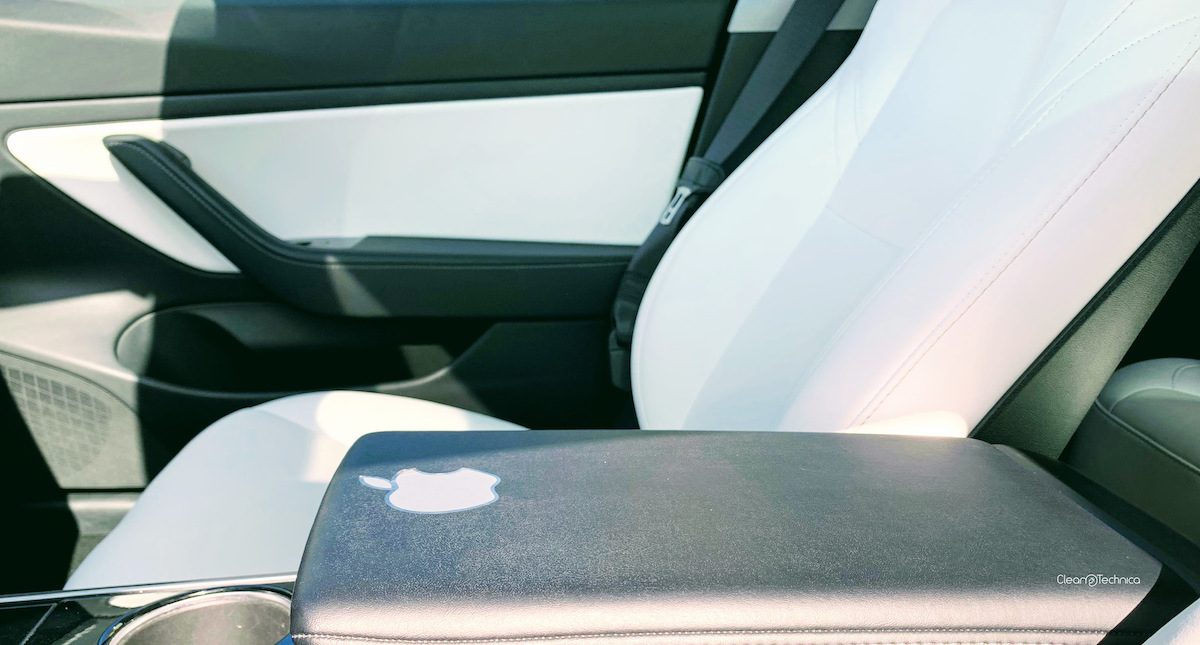
The story of the Apple car has turned into a running joke with a tragicomedy punchline. When it comes to electric cars, the company that changed the course of history with the iPhone can’t design its way out of a wet paper bag. According to Wikipedia, plans to build an Apple electric car began with founder Steve Jobs as far back as 2008.
Apple is as tight lipped about what is going on inside the company as is Tesla, which is another way of saying both companies severely limit the amount of information available about their future plans. Wikipedia details a long and complex program that was always focused on self driving cars.
n August 2015, The Guardian reported Apple met with officials from GoMentum Station, a testing ground for connected and autonomous vehicles in Concord, California. In September 2015, there were reports that Apple was meeting with self-driving car experts from the California Department of Motor Vehicles. In September 2015, the Wall Street Journal said the Apple car would be unveiled in 2019. Also in 2015 Apple investor Carl Icahn said he believed rumors that Apple would enter the automobile market in 2020 with a car that would be “the ultimate mobile device.”
Over the years, Apple has been linked to most of the world’s major automakers — and quite a few others. At one time it was believed Faraday Future was a front for Apple. There were reports in 2016 that Apple was talking to Magna — the largest contract car manufacturer in the world.
After proposed partnership arrangements with Germany’s high-end brands BMW and Mercedes-Benz failed as did potential alliances with Nissan, BYD Auto, McLaren Automotive, and others including Porsche, Apple reportedly partnered with Volkswagen to create an autonomous version of the VW T6 commercial van.
Subsequently, Apple was rumored to be exploring a business relationship with Hyundai Motor Group. In February 2021 it appeared that Apple was close to a $3.59 billion deal with Hyundai to use its West Point, Georgia manufacturing plant to build a fully autonomous car without a driver’s seat. Later that month, Hyundai and Kia confirmed that they were not in talks with Apple to develop a car.
Apple is also reported to have opened discussions with Canoo and rumors it was seeking to partner with several Japanese manufacturers were so persistent that Nissan felt it necessary to step forward to make it clear it was one of the few automakers on the face of the Earth not in discussions with Apple.
Apple Focuses On Autonomy
Over the years , the number of people supposedly working on the Apple car ballooned to more than 1,000. High profile industry figures such as former Tesla engineer Doug Field arrived in Cupertino and then swiftly departed as Apple first expanded then shrank the program. Through all this backing and filling, the one consistent theme has been that an Apple car would be able to drive itself. In 2018, Apple is said to have had 70 permits from CalDOT to test autonomous vehicles on public roads. In June 2019, Apple acquired autonomous vehicle startup Drive.ai.
Fast forward to January, 2024. Bloomberg now says sources tell it production of an Apple car has now been pushed back to 2028 — at the earliest. That’s not good news but what is truly distressing is that the car, when and if it ever arrives, will only be capable of Level 2+ autonomy. The prior design for the vehicle called for a system that wouldn’t require human intervention on highways in approved parts of North America and could operate under most conditions.
The more basic Level 2+ plan would require drivers to pay attention to the road and take over at any time — similar to the current standard Autopilot feature on Tesla’s EVs. In other words, it will offer no significant upgrades to existing driver assistance technology from most manufacturers available today. If that is the case, what’s the point?
Bloomberg says the company has been meeting with potential manufacturing partners in Europe to discuss the new approach. After the initial car debuts, Apple hopes to release an upgraded system later that supports Level 4 autonomy and additional regions. In that scenario, the vehicle operates totally on its own but still only under certain conditions. Level 5 means the car can drive itself anywhere under any circumstances.
The new strategy apparently was adopted after a series of frenzied meetings that included Apple’s board, project head Kevin Lynch, and CEO Tim Cook. The board had pressed Apple leadership about the car plan for several months during 2023, according to sources who discussed the plan with Bloomberg.
The Apple car project, known internally as Project Titan, has been one of the company’s most expensive research and development projects for the better part of a decade. Apple reportedly has spent hundreds of millions of dollars a year on salaries, cloud-based systems for controlling self-driving cars, closed road testing, and engineering for both vehicle parts and chips. Other parts of the team have focused on car interiors and exteriors, and other key components. And yet, the vehicle has never successfully reached a formal prototype stage.
Even with the new plan, some Apple executives are skeptical that a vehicle could ever provide the kind of profit margins that the company enjoys on iPhones. Still, a car in the $100,000 range would fuel revenue [if they can sell any] and help Apple plant a flag in the growing EV sector. Internally, the Apple car project is still seen by some as a “me-too” attempt to emulate Tesla — hardly a worthy endeavor for such a technology leader as Apple.
Apple’s tech peers have become significant players in the automotive industry. Amazon invested in Rivian, which makes delivery trucks for the e-commerce giant. Alphabet’s Waymo division has ramped up work on autonomous cars. Key competitors in China, including Huawei Technologies and Xiaomi Corp., have recently introduced electric cars of their own.
As part of the new plan, Apple is weighing further management changes to both its hardware engineering and autonomous software teams, the people said. Many of the remaining Project Titan executives have manufacturing experience at other car companues, specifically Ford, Porsche, and Lamborghini.
The Takeaway
There is so much to unpack here, it’s hard to know where to begin. The dream of self driving cars has a powerful allure. Google has been chasing it for decades. Elon Musk has staked his company on it. Everyone thinks self driving cars would be so unbelievably cool. The latest GM ad features a squad of strapping young lads who savor the joy of a self driving truck after an exhausting day of ripping up the tundra on their ATVs.
Which begs this question — is self driving technology a party trick? It may be a boon for disabled people but is there any reason why ordinary people should be excused from actually — you know — driving? It seems abundantly clear that the idea of self driving cars as little more than horizontal elevators is deeply flawed. Safety is often touted as the reason for autonomy but wouldn’t society be better served by technologies that prevent drunks, tweakers, and people who insist on texting while driving from operating a motor vehicle?
In the final analysis, is autonomous driving technology just a way for car companies to squeeze more money out of their customers via an endless assortment of subscription services? “Pedestrian detection now half off when you bundle it with parallel parking assist. Try it for one month free. Cancel at any time.”
It should be intuitively obvious to the most casual observer that the promise of self driving vehicles will never be fully realized if they are required to interact with every other car on the road, every pedestrian, every bicyclist, every child who darts into the street while chasing an errant ball, and every impaired driver. Perhaps in addition to self driving cars, we need new infrastructure in our cities and towns that provides restricted travel lanes accessible only to autonomous vehicles.
Another aspect of this discussion is the “cars as entertainment” movement. Sony and Honda are threatening to unleash a new electric car called Afeela that is nothing more than a rolling digital play space. Whatever happened to cars as a means of transportation? In a recent article, Autoblog celebrates the fact that the Mazda Miata finally has a real infotainment screen. Well, excuse me. I drove a Miata for 20 years and to me, the car was the star of the show.
There’s another aspect to all this. The world is awash in cars and trucks. Tens of millions of new cars are built and sold every year. Our cities are overwhelmed by them. Freeways now resemble parking lots during rush hour. Perhaps society should be focused more on reducing the number of cars on the road instead of cranking out more. Even electric cars have significant ecological impacts from the production process. Adding more and more cars every year is simply unsustainable.
But the allure of autonomous cars obscures all those other considerations. Is there a possibility it is just a scam to extract more corporate profits at a time when the Earth needs real solutions to its automobile obsession? Finally, there is this question. Does the world need another $100,000 electric car? It’s a question we think deserves to be asked.
Have a tip for CleanTechnica? Want to advertise? Want to suggest a guest for our CleanTech Talk podcast? Contact us here.
Latest CleanTechnica TV Video
[embedded content]I don't like paywalls. You don't like paywalls. Who likes paywalls? Here at CleanTechnica, we implemented a limited paywall for a while, but it always felt wrong — and it was always tough to decide what we should put behind there. In theory, your most exclusive and best content goes behind a paywall. But then fewer people read it!! So, we've decided to completely nix paywalls here at CleanTechnica. But...
Thank you!
Advertisement
CleanTechnica uses affiliate links. See our policy here.
- SEO Powered Content & PR Distribution. Get Amplified Today.
- PlatoData.Network Vertical Generative Ai. Empower Yourself. Access Here.
- PlatoAiStream. Web3 Intelligence. Knowledge Amplified. Access Here.
- PlatoESG. Carbon, CleanTech, Energy, Environment, Solar, Waste Management. Access Here.
- PlatoHealth. Biotech and Clinical Trials Intelligence. Access Here.
- Source: https://cleantechnica.com/2024/01/27/apple-car-pushed-back-to-2028-autonomous-driving-forget-about-it/
- :has
- :is
- :not
- :where
- $3
- $UP
- 000
- 1
- 15%
- 20
- 20 years
- 2008
- 2015
- 2016
- 2018
- 2019
- 2020
- 2021
- 2023
- 2024
- 2028
- 36
- 70
- a
- Able
- About
- accessible
- According
- acquired
- actually
- Ad
- adding
- addition
- Additional
- adopted
- Advertise
- Affiliate
- After
- AI
- All
- Alliances
- allure
- also
- always
- Amazon
- america
- amount
- an
- analysis
- and
- Another
- any
- anywhere
- appeared
- Apple
- apple car
- approach
- approved
- ARE
- arrangements
- arrived
- Arrives
- article
- AS
- aspect
- assist
- Assistance
- assortment
- At
- attempt
- attention
- AUGUST
- auto
- automakers
- automobile
- automotive
- automotive industry
- autonomous
- autonomous car
- autonomous cars
- autonomous vehicle
- autonomous vehicles
- Autonomy
- autopilot
- available
- back
- backing
- bag
- ball
- basic
- BE
- become
- been
- began
- begin
- behind
- believed
- BEST
- Better
- Billion
- Bit
- Bloomberg
- BMW
- board
- both
- brands
- build
- built
- Bundle
- business
- but
- by
- byd
- california
- called
- CAN
- canoo
- capable
- car
- Carl
- cars
- case
- casual
- celebrates
- ceo
- certain
- changed
- Changes
- child
- China
- chip
- Chips
- circumstances
- Cities
- cleantech
- Cleantech Talk
- clear
- Close
- closed
- comes
- commercial
- Companies
- company
- Company’s
- competitors
- completely
- complex
- components
- conditions
- CONFIRMED
- connected
- considerations
- consistent
- content
- contract
- controlling
- Cool
- Corp
- Corporate
- could
- course
- create
- Current
- Customers
- day
- deal
- Debuts
- decade
- decades
- decide
- decided
- deeply
- delivery
- Department
- deserves
- Design
- details
- Detection
- develop
- Development
- device
- DID
- digital
- disabled
- discuss
- discussed
- discussion
- discussions
- Division
- does
- dollars
- don
- doug
- dream
- drive
- driver
- drivers
- driving
- during
- e-commerce
- earliest
- earth
- Ecological
- Electric
- electric car
- electric cars
- Elon
- Elon Musk
- embedded
- endeavor
- Endless
- engineer
- Engineering
- Enter
- Europe
- EV
- Even
- EVER
- Every
- everyone
- evs
- Exclusive
- executives
- existing
- expanded
- expensive
- experience
- experts
- Exploring
- extract
- Face
- fact
- Failed
- far
- Feature
- Features
- February
- felt
- few
- fewer
- field
- Figures
- filling
- final
- Finally
- First
- flawed
- focused
- focuses
- For
- Ford
- formal
- Former
- Forward
- founder
- Free
- from
- front
- Fuel
- fully
- further
- future
- Georgia
- giant
- GM
- Goes
- going
- good
- Ground
- Group
- Growing
- Guest
- had
- Half
- happened
- Hard
- Hardware
- Have
- he
- head
- help
- here
- High
- High-End
- highways
- his
- history
- hopes
- Horizontal
- hour
- HTTPS
- Huawei
- human
- Hundreds
- hundreds of millions
- Hyundai
- i
- idea
- if
- Impacts
- implemented
- in
- In other
- included
- Including
- industry
- information
- Infrastructure
- initial
- inside
- instead
- interact
- internally
- intervention
- into
- introduced
- invested
- investor
- iPhone
- IT
- ITS
- itself
- January
- Japanese
- Jobs
- joy
- june
- just
- Key
- Kia
- Kind
- Know
- known
- Lamborghini
- largest
- later
- latest
- leader
- Leadership
- Level
- level 4
- like
- likes
- LIMIT
- Limited
- linked
- links
- little
- Long
- lots
- lynch
- major
- make
- MAKES
- management
- Manufacturer
- Manufacturers
- manufacturing
- many
- margins
- Market
- May..
- McLaren
- me
- means
- Media
- meeting
- meetings
- met
- millions
- Mobile
- mobile device
- money
- Month
- months
- more
- most
- Motor
- movement
- much
- Musk
- necessary
- Need
- needs
- never
- New
- news
- Nissan
- no
- North
- north america
- nothing
- now
- number
- obvious
- of
- off
- offer
- officials
- often
- on
- ONE
- only
- opened
- operate
- operates
- operating
- or
- ordinary
- Other
- Others
- our
- out
- over
- overwhelmed
- own
- Paper
- Parallel
- parking
- part
- partner
- partnered
- partners
- Partnership
- parts
- party
- Pay
- peers
- People
- perhaps
- permits
- plan
- plans
- plant
- plato
- Plato Data Intelligence
- PlatoData
- Play
- player
- players
- podcast
- Point
- policy
- Porsche
- possibility
- potential
- powerful
- prevent
- Prior
- process
- Production
- Profile
- Profit
- profits
- Program
- project
- projects
- promise
- proposed
- prototype
- provide
- provides
- public
- publish
- pushed
- put
- question
- quite
- range
- reached
- Read
- Reader
- real
- realized
- reason
- recent
- recently
- reducing
- regions
- relationship
- release
- remaining
- Reported
- reportedly
- Reports
- require
- required
- research
- research and development
- restricted
- revenue
- rivian
- road
- roads
- Rolling
- rumored
- Rumors
- running
- rush
- Safety
- Said
- salaries
- saying
- says
- Scam
- scenario
- Screen
- sector
- see
- seeking
- seems
- seen
- SELF
- Self Driving Cars
- self-driving
- self-driving car
- sell
- September
- Series
- served
- Services
- several
- severely
- should
- show
- significant
- similar
- simply
- skeptical
- So
- Society
- Software
- sold
- Solutions
- some
- Sources
- Space
- specifically
- spent
- Squeeze
- Stage
- Staked
- standard
- Star
- startup
- station
- Step
- Steve
- Still
- Stories
- Story
- Strategy
- street
- subscription
- subscription services
- Successfully
- such
- suggest
- support
- Supports
- swiftly
- system
- Systems
- T
- Take
- Talk
- talking
- Talks
- team
- teams
- tech
- Technologies
- Technology
- tell
- tens
- Tesla
- test
- Testing
- texting
- than
- that
- The
- the world
- their
- Them
- theme
- then
- theory
- There.
- they
- think
- Thinks
- this
- those
- Through
- Tim
- time
- tip
- titan
- to
- today
- TOTALLY
- tough
- touted
- towns
- transportation
- travel
- truck
- Trucks
- truly
- try
- Turned
- tv
- ultimate
- under
- unleash
- unsustainable
- unveiled
- Updates
- upgraded
- upgrades
- us
- use
- uses
- Ve
- vehicle
- Vehicles
- version
- via
- Video
- volkswagen
- vw
- want
- was
- Way..
- waymo
- we
- weighing
- WELL
- were
- West
- What
- What is
- whatever
- when
- which
- while
- WHO
- why
- Wikipedia
- will
- with
- without
- words
- Work
- working
- world
- world’s
- worthy
- would
- write
- Wrong
- Xiaomi
- year
- years
- yet
- you
- young
- Your
- youtube
- zephyrnet






